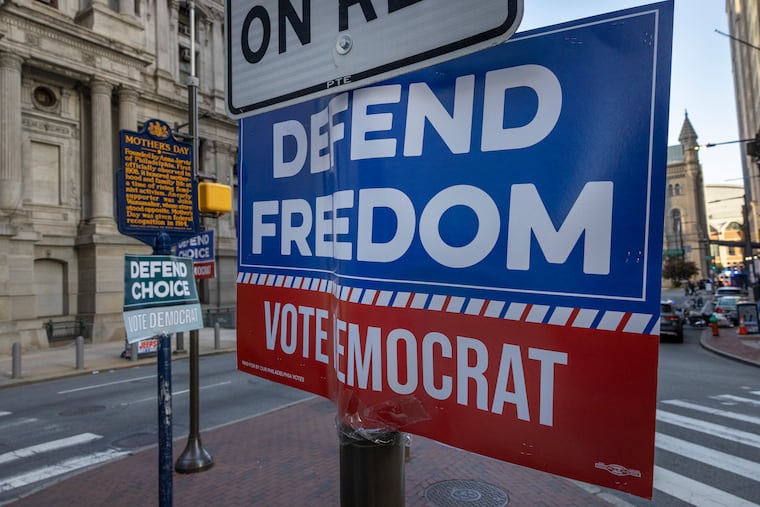All voters deserve a say in who gets to run Philadelphia | Editorial
Most large cities, recognizing the futility of using a two-party system in a one-party town, have changed their electoral system. Philly should follow suit.

Sixty thousand Democratic votes. In a city of almost 1.6 million people — with more than a million registered voters — that’s how many could choose the city’s next mayor on May 16.
It may seem improbable that so few people, fewer than the capacity of Lincoln Financial Field, could determine who runs Philadelphia. But thanks to our city’s outdated electoral system, it just might happen, according to a voter turnout analysis by former Republican mayoral nominee Sam Katz.
That’s because a crowded field of qualified candidates in the Democratic primary will invariably split the vote, and the Democratic nominee, whoever he or she may be, is virtually assured of a win in November.
It wasn’t always this way. While Philadelphia hasn’t elected a Republican mayor since the Harry Truman administration, the general election was at least competitive. Arlen Specter, Thacher Longstreth, Frank Rizzo, and Katz himself all came relatively close to winning office as GOP candidates. Each of their elections featured hundreds of thousands of votes cast on each side. Since Katz’s last run in 2003, however, Republican nominees have only once garnered over 20% of the vote.
Most large cities, recognizing the futility of using a two-party system in a one-party town, have moved on. Philadelphia should do so, too.
» READ MORE: The Inquirer’s 2023 Endorsement Guide
Los Angeles, Chicago, Houston, and Boston all utilize nonpartisan election systems to pick their mayor, which allow voters to have a say in their city’s future without joining a political party. Candidates of all political persuasions run in a single primary, and if no one takes a majority, the top two proceed to a runoff.
While some progressives may rue the inclusion of the city’s Republicans and independents into the political process, nonpartisan elections haven’t prevented left-leaning Democrats from winning office, as Chicago’s Brandon Johnson and Boston’s Michelle Wu have proved.
Nonpartisan primaries do, however, require that any candidate, progressive or not, hold some appeal to a majority of the city’s electorate. That’s a much better mandate for change than less than a stadium’s worth of partisan primary votes.
Still, while the nonpartisan runoff system is a step in the right direction, it also has its pitfalls. Runoffs can become highly combative, driving wedges into existing fault lines in city politics. Any election between two candidates increases the temptation to engage in negative campaigning, which is exactly what happened in Boston and Chicago. That’s where New York City’s choice to embrace ranked choice voting comes in.
Rather than a divisive second election, ranked choice voting allows for both the primary and runoff to happen at the same time. Under that system, voters rank candidates by preference. If no candidate wins a majority, the candidate with the fewest first-preference votes is eliminated, with their votes going to the next candidate by preference. The process is repeated until there is a winner.
With ranked choice voting, candidates also become hesitant to attack rivals whose supporters’ second- and third-place votes they may need. Candidates who are trailing in money and endorsements, such as Maria Quiñones Sánchez and Derek Green, become less easily dismissed by voters.
» READ MORE: Look to mayors past for a guide to Philadelphia’s future | Editorial
There are signs that ranked choice voting’s time may have arrived. All the major Democratic nominees for mayor have publicly embraced the idea at forums, and a poll conducted by the Committee of Seventy suggested that most respondents found the process easy, and favored implementing it in Philadelphia. State Sen. Anthony Williams has introduced a bill that would authorize municipalities to use the system.
If that bill passes, all that would be needed is an amendment to the City Charter. Unlike some of the ceremonial amendments and misguided reforms to city government that have passed in recent years, this change would be worth pursuing. If nothing else, it would help fight political cynicism and get more Philadelphians engaged with local government once again.
Considering Philadelphia’s serious, systemic problems, such as gun violence, failing schools, poverty, lack of economic opportunity, and some of the communities hardest hit by the opioid crisis, people should be lining up to have their voices heard. Instead, too many have become resigned to believing that things cannot get better, no matter who wins.
Changing the system to meet the needs of the city’s voters may not be a panacea, but it could convince more Philadelphians that demanding change is worth it.